- Home
- Peter Ackroyd
The Plato Papers
The Plato Papers Read online
Table of Contents
Title Page
Dedication
Epigraph
Praise
The Lectures and Remarks of Plato on the Condition of Past Ages
Chapter 1
Chapter 2
Chapter 3
Chapter 4
Chapter 5
Chapter 6
Chapter 7
Chapter 8
Chapter 9
Chapter 10
Chapter 11
Chapter 12
Chapter 13
Chapter 14
Chapter 15
Chapter 16
Chapter 17
Chapter 18
Chapter 19
Chapter 20
Chapter 21
Chapter 22
Chapter 23
Chapter 24
Chapter 25
Chapter 26
Chapter 27
Chapter 28
Chapter 29
Chapter 30
Chapter 31
Chapter 32
The Journey of Plato to the Underworld
Chapter 33
The Trial of Plato Charged with Corrupting the Young by Spinning Lies and Fables
Chapter 34
Chapter 35
Chapter 36
Chapter 37
Chapter 38
Chapter 39
Chapter 40
Chapter 41
Chapter 42
Chapter 43
Chapter 44
Chapter 45
Chapter 46
Chapter 47
Chapter 48
Chapter 49
The Judgment Upon Plato
Chapter 50
Chapter 51
Chapter 52
Chapter 53
Chapter 54
Chapter 55
About the Author
ALSO BY PETER ACKROYD
Copyright Page
For Elizabeth Wyndham
I often envisage, in this new age of universal and instantaneous communication, how our planet might appear to distant observers. It must seem to shimmer in a state of continual excited activity, rather like a round diamond in the sky.
Ronald Corvo, A New Theory of the Earth, 2030.
All fallen dark and quiet, all gone down. Collapsophe.
Joseph P., Diaries, 2299.
We who survive, we scoured ones, in depths of dark dismay, call out of the night of our world, gone as we knew it, as we know it.
London hymn, c. 2302.
Slivers of light. Silvers. Little horn-shaped lights, riding the waves of darkness.
Joseph P., Diaries, 2304.
Myander, a Londoner, wrote the history of a changing world, beginning at the moment of transition, believing that it would mark a great epoch, one more worthy of relation than any that had come before. This belief was not without its grounds. The world of science had collapsed, but the divine consciousness of humanity had not yet asserted itself. All the labours of Myander lay in recording the manifest signs of dismay and wonder. Since the events of distant antiquity, even those immediately preceding the great change, cannot clearly be understood she believed it her duty to enquire carefully into immediate circumstances.
Myander, History, 2310.
The holy city, restored. Ourselves, revived.
Proclamation, 2350.
The components of the light have been carefully studied. In addition to manifold influences on the human plane, such as will and desire, there are tokens of power from the earth itself. The smallest territory can exert its influence, moving those who come within its boundaries. This city, for example, is not indifferent to the joys or sufferings of its inhabitants.
The London Intelligencer, 2998.
I cannot pretend to have been present during the glorious restoration of human light, the greatest and perhaps most significant scene in the narrative of humankind. Yet I believe that I am blessed in another sense, living on the verge of a new age. All around me I am beginning to see greatness and munificence erected, while our citizens with wonderful zeal have tried to revive and emulate the labours of distant antiquity. When asked why they are engaged in this pursuit, they reply ‘Why not? What else is there to do?’ This is our new spirit!
Letter from Popcorn to Mellitus, 3399.
The city bears us. The city loves its burden. Nurture it in return. Do not leave its bounds.
Proclamation, 3506.
In returning to the origin of all things, we meet our destiny. Do you see our doubles, passing by us weeping? This is the nature of our world.
Proverbs of Restituta, guardian of London, 3640.
It is sometimes considered wayward or importunate to paint a portrait of one man, yet we know from the pictures of parishioners lit upon the Wall of our great and glorious city that a single feature or glance may embody a fateful moment or an eventful transaction. So I intend to conjure up a likeness of Plato, the great orator of London, in a similar fashion. I will practise the art of selection; like the displays of our actors continually before us, some events will be presented on a grand scale and others diminished. The conventions of spherical drama will be preserved from the beginning to the end; the revelations and lamentations, for example, will be in strict keeping with each other. By these means we may see his unhappily brief life as a continual search after truth. But it will also be my duty faithfully to record Plato’s final days in the city and to ascertain how a cruel superstition excercised boundless dominion over the most elevated and benevolent mind.
Anon., The Plato Papers, 3705.
ACCLAIM FOR Peter Ackroyd’s THE PLATO PAPERS
“Peter Ackroyd is a visionary, as The Plato Papers makes clear. This is one of the oddest but most important novels to appear in many years. This masterpiece of contemporary writing will thrill and entertain readers for years to come, but it will do more than that: it will enlarge their vision, stimulating organs long forgotten and never known.”
—Jay Parini, author of The Last Station and Robert Frost: A Life
“[The Plato Papers] makes an easy introduction to an author who, like Plato, questions the century’s most treasured assumptions. Insidiously, he persuades readers to doubt them, too.”
—San Francisco Chronicle
“A work that manages to be at once metaphysical romp, vaudeville routine, survey of human history, and satire on contemporary society and smug academics.”
—The Seattle Times
“What makes [The Plato Papers] notable is not its fantastic invention but its intelligence. . . . Excellently written . . . with a truly Socratic curiosity, making The Plato Papers a philosophical good read.”
—Malcolm Bradbury, Financial Times
“Ackroyd is such a wonderful writer, his sentences pop with wit and weight. This newest book is intellectual and entertaining, no small accomplishment.”
—The Commercial Appeal (Memphis)
“[A] rollicking and merry paean to the redemptive properties of ignorance. . . . Hilarious and wonderful.”
—The Buffalo News
“This is a marvelous fable for our times. It is funny, wise, and strange. . . . In the eighteenth century, Dean Swift cast a scorching searchlight on his own times by isolating their follies in imagined lands to which Gulliver made his imaginary travels. Ackroyd has pulled off a similar feat of travel in time and imagination.”
—A. N. Wilson, Daily Mail
“The Plato Papers is likely to challenge readers for generations to come.”
—The Christian Science Monitor
“An invigorating meditation on the changelessness, after no matter how many eons, of human nature and its uneasiness with the unfamiliar.”
—Time
“The Plato Papers is a little book that raises some big questions. . . . You can finish the book in a couple of hours. But if you read it carefully, you’ll go on thinking about it for days.” —The Philadelphia Inquirer
“Imaginative, witty, incisive fiction.”
—Richmond Times-Dispatch
“Erudite and highly original . . . Peter Ackroyd combines Swiftian social satire with philosophical wisdom to illustrate the symbiotic and confusing relationships between fiction, history and philosophy.”
—The Tennessean
“It is like T. S. Eliot on speed meets Martian poetry but with better jokes.”
—The Times (London)
c. 3500 BC–c. 300 BC: The Age of Orpheus
c. 300 BC–c. AD 1500: The Age of the Apostles
c. AD 1500–c. AD 2300: The Age of Mouldwarp
c. AD 2300–c. AD 3400: The Age of Witspell
c. AD 3700: The Present
The Lectures and Remarks of Plato on the Condition of Past Ages
1
Sparkler: Wait, Sidonia, wait!
Sidonia: Gladly.
Sparkler: I just saw you in the market. You were standing beneath the city wall, and so I assumed that you were listening to Plato’s oration.
Sidonia: Correct in every respect, Sparkler. But I expected to see you there, since you always celebrate the feast of Gog.
Sparkler: I was about to cross the Fleet, and join you, when Madrigal stopped me.
Sidonia: What did he want?
Sparkler: Only something about a parish meeting. But, as a result, I missed Plato’s opening remarks. I heard only his ending, when he spoke of his sorrow at the darkness of past ages.
Sidonia: It was all very interesting. There was a period when our ancestors believed that they inhabited a world which revolved around a sun.
Sparkler: Can it be true?
Sidonia: Oh yes. They had been told that they lived upon a spherical planet, moving through some kind of infinite space.
Sparkler: No!
Sidonia: That was their delusion. But it was the Age of Mouldwarp. According to Plato, the whole earth seemed to have been reduced and rolled into a ball until it was small enough to fit their theories.
Sparkler: But surely they must have known—or felt?
Sidonia: They could not have known. For them the sun was a very powerful god. Of course we were all silent for a moment, after Plato had told us this, and then he laughed.
Sparkler: He laughed?
Sidonia: Even when he had taken off the orator’s mask, he was still smiling. Then he began to question us. ‘Do you consider me to be small? I know that you do. Could you imagine the people of Mouldwarp to be much, much smaller? Their heads were tiny, and their eyes like pinpoints. Do you know,’ he said, ‘that in the end they believed themselves to be covered by a great net or web?’
Sparkler: Impossible. I never know when Plato is telling the truth.
Sidonia: That is what he enjoys. The game. That is why he is an orator.
Sparkler: We who have known him since childhood—
Sidonia: —never cease to wonder.
Sparkler: But who could be convinced by such wild speculations?
Sidonia: Come and decide for yourself. Walk with me to the white chapel, where he is about to begin his second oration.
2
I will speak of a novelist, Charles Dickens, who flourished in a period somewhere between the seventeenth and twentieth centuries of our earth. The titles of his works have been retrieved but only one text survives, alas in an incomplete form. Seven pages have been removed, and the author’s name partially defaced, for reasons which are unknown to me. Most of the narrative remains, however, and it provides a unique opportunity to examine the nature of Mouldwarp imagination. The novel is entitled On the Origin of Species by Means of Natural Selection, by Charles D—. The rest of the name has been gouged out by some crude tool, and the phrase ‘Vile stuff!’ written in a dye-based substance. Clearly the reader did not approve of the fiction! Perhaps it was too melodramatic, or romantic, for her refined taste! Despite this erasure, we have no cause to doubt that this novel was composed by the author of Great Expectations and Hard Times.
It opens with a statement by the hero of the narrative—‘When on board HMS Beagle, as a naturalist, I was much struck with certain facts . . .’— who then proceeds to tell his remarkable story. By observing bees, and pigeons, and various other creatures around him, he manages to create within his own mind an entire world of such complexity that eventually he believes it to be real. This is reminiscent of another fiction we have recovered, Don Quixote, in which the protagonist is similarly deluded. The quixotic hero of The Origin, however, is portrayed as being obsessed by ‘struggle’, ‘competition’, and ‘death by natural selection’, in a manner both morbid and ludicrous. He pretends to be exact in his calculations but then declares that ‘I have collected a long list of such cases but here, as before, I lie under a great disadvantage in not being able to give them’. This wonderfully comic remark is succeeded by one no less rich in inadvertent humour. ‘It is hopeless’, he states, ‘to attempt to convince anyone of the truth of this proposition without giving the long array of facts I have collected, and which cannot possibly be here introduced.’ Here is a character who, if real, would not have been believed!
The subtlety of Charles Dickens’s fiction now becomes apparent. In the act of inventing this absurd fellow, this ‘naturalist’ travelling upon the extraordinarily named Beagle, he has managed indirectly to parody his own society. The subtitle of the novel itself suggests one of the objects of his satire—‘The Preservation of Favoured Races in the Struggle for Life’ refers to the Mouldwarp delusion that all human beings could be classified in terms of ‘race’, ‘gender’ or ‘class’. We find interesting evidence of this in the anecdotes of a comedian, Brother Marx, of whom I will speak at a later date. Yet Dickens is able to mock this eccentric hypothesis through the words of his hapless narrator, who suggests that ‘widely ranging species which have already triumphed over many competitors . . . will have the best chance of seizing on new places when they spread into new countries’. It should be recalled that in the middle period of Mouldwarp the separate nations fought and colonised each other; as our hero puts it in his usual bland fashion, ‘the northern forms were enabled to beat the less powerful southern forms’ with the purpose ‘of being victorious in distant lands in the struggle for life with foreign associates’. It is the final masterstroke of irony by Charles Dickens that his character solemnly maintains the pretence of discussing only birds and insects, while at the same time providing a wonderfully succinct if brutal summary of the society from which he came!
His is a dark world indeed, dominated by the necessity of labour and the appetite for power. Even the bees are ‘anxious . . . to save time’, and the protagonist extols ‘the more efficient workshops of the north’; nature itself is described as frugal or even miserly, with a continual desire ‘to economise’! Yet, in a transitional chapter of this novel, the hero ceases to be merely comic and reveals more malign or sinister characteristics. He suggests the need for ‘heavy destruction’ and announces, with no irony at all, ‘let the strongest live and the weakest die’. In one remarkable passage he celebrates the spectacle of violent death—‘we ought to admire’, he informs us, ‘the savage instinctive hatred of the queen bee, which instantly urges her to destroy the young queens, her daughters’. We have come across fragments of writing—‘the death of queens’, ‘queens have died young and fair’—which suggest that he is here alluding to a dramatic tradition now lost to us. But nothing can disguise his own interest in carnage.
Combat and slaughter, in fact, become the principal components of the unreal world which he has created. He imagines all life on earth to be derived from one ‘common parent’ or ‘primordial form’; the offspring of this ‘prototype’ then develop into various species of animal or plant, which in turn fight among themselves in order to
‘progress towards perfection’. He calls it ‘evolution’. No laughter, please. He is only the protagonist of a novel! Well, laugh if you must. But remember that Charles Dickens himself is satirising the blind pretensions of his era. Remember, too, that no one from this dark past could have known that all aspects of the world change suddenly and that new organic life appears when the earth demands it. Only in the Age of Witspell, for example, was it realised that the petrified shapes found in rock or ice were created to mock or mimic their organic counterparts. In the same period it was also recognised that each portion of the earth produces its own creatures spontaneously.
I will conclude this oration with a theme introduced by the novel itself. Even as the protagonist concludes his false and rambling description of the natural world, he reflects upon his own experience in lugubrious terms. ‘How fleeting are the wishes and efforts of man,’ he complains, ‘how short his time!’ These are typical Mouldwarp sentiments but, on this occasion, they come from a deluded scholar who claimed to understand the motive power behind such general ‘wishes and efforts’! May I recommend The Origin of Species to you, then, as a comic masterpiece?
3
Madrigal: Did you enjoy the oration?
Ornatus: Immensely. Even the angels seemed interested, especially when Plato mentioned that theory— that thing—what was it?
Madrigal: Convolution?
Ornatus: Precisely. Convolutions. I had to laugh.
Madrigal: We all did. But why are the beliefs of our ancestors so ridiculous? I am sure that they were sincerely held.
Ornatus: No doubt.
Madrigal: Perhaps, in the future, someone might laugh at—well—you and me.
Ornatus: There is nothing funny about us.
Madrigal: As far as we know.
Ornatus: A good point. We must ask Plato about this as soon as possible. To think that in our school-days we were all in the same parish—you, me, Plato.
Madrigal: And Sparkler. How could you forget Sparkler? With his long robe and white hair.
Ornatus: And Sidonia, too, with her red hair and the blue light shining from her.

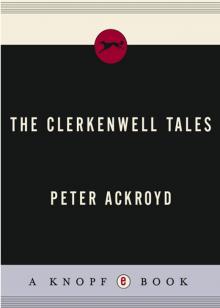 The Clerkenwell Tales
The Clerkenwell Tales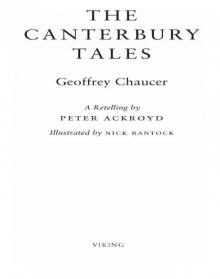 The Canterbury Tales
The Canterbury Tales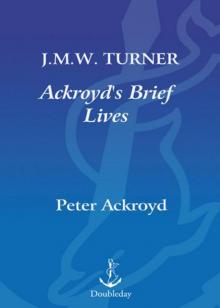 J. M. W. Turner
J. M. W. Turner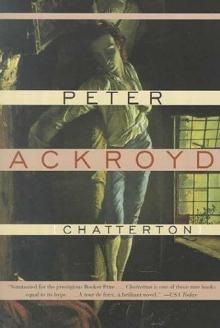 Chatterton
Chatterton The Canterbury Tales – A Retelling
The Canterbury Tales – A Retelling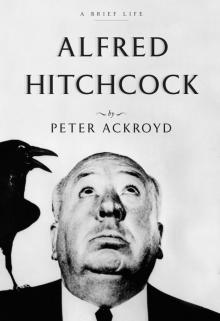 Alfred Hitchcock
Alfred Hitchcock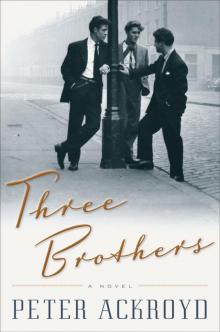 Three Brothers
Three Brothers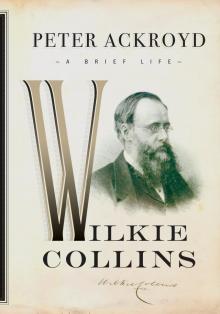 Wilkie Collins
Wilkie Collins Venice
Venice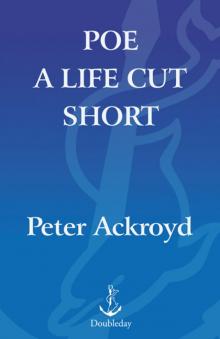 Poe
Poe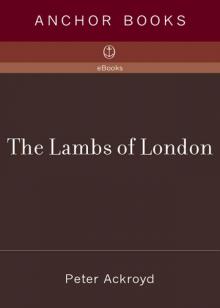 The Lambs of London
The Lambs of London London
London Queer City
Queer City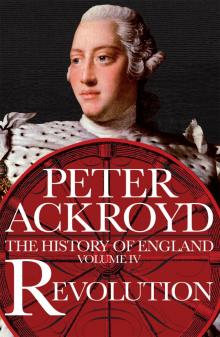 Revolution, a History of England, Volume 4
Revolution, a History of England, Volume 4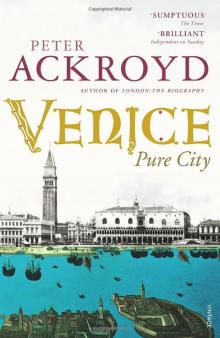 Venice: Pure City
Venice: Pure City Foundation
Foundation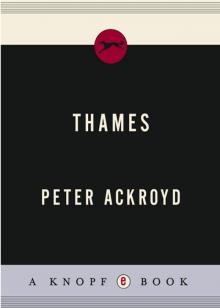 Thames
Thames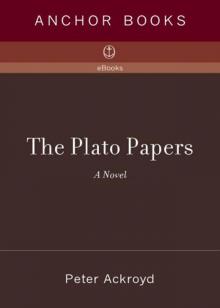 The Plato Papers
The Plato Papers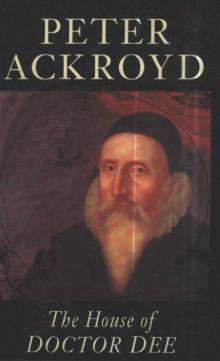 The house of Doctor Dee
The house of Doctor Dee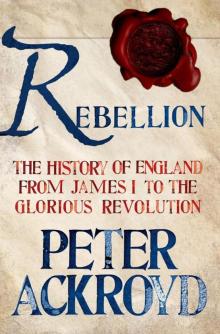 Rebellion: The History of England from James I to the Glorious Revolution
Rebellion: The History of England from James I to the Glorious Revolution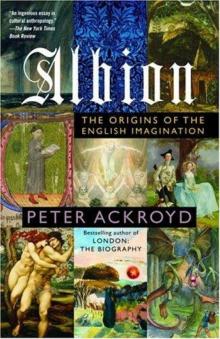 Albion: The Origins of the English Imagination
Albion: The Origins of the English Imagination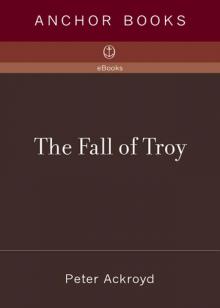 The Fall of Troy
The Fall of Troy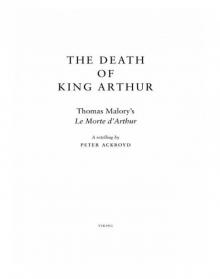 The Death of King Arthur
The Death of King Arthur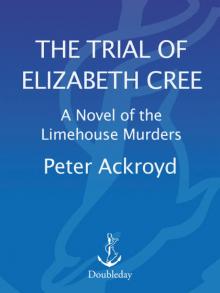 The Trial of Elizabeth Cree
The Trial of Elizabeth Cree London: The Biography
London: The Biography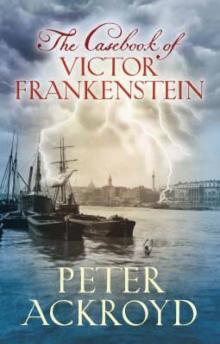 The Casebook of Victor Frankenstein
The Casebook of Victor Frankenstein Hawksmoor
Hawksmoor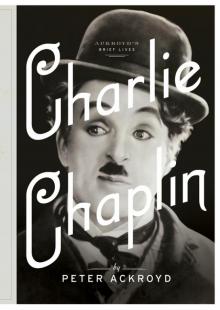 Charlie Chaplin
Charlie Chaplin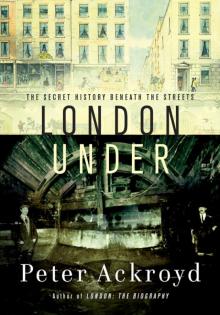 London Under
London Under